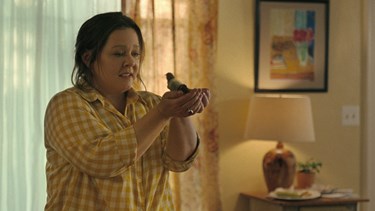
There has never been another star like Melissa McCarthy. Bright, boisterous, and plainspoken, the actor, writer, and producer has burst through so many glass ceilings that Hollywood doesn’t try to contain her anymore. This is just as well, because she’s most brilliant when allowed to call the shots.
Ironically, the secret to her success is an extraordinary take on the ordinary—finely tuned, hyper-charged renderings of the myriad women rarely represented on film. The Illinois native got her start in the Los Angeles comedy troupe The Groundlings, and her flair for improvisation threads through nearly all her roles. Perhaps best known as the comedic alpha dog of such projects as The Heat (2013) and Bridesmaids (a 2011 role that scored an Oscar nod and landed her on everyone’s radar), McCarthy’s ability to rev herself into a veritable Cadillac of an insult machine is unparalleled. Jackie Gleason himself would be proud of her fuming.
Take her walk-on role in Judd Apatow’s coming-of-middle-age comedy This Is 40 (2012). Her scene as a private school parent incensed by smug sweethearts Leslie Mann and Paul Rudd lasts all of five minutes, but it’s the five minutes you remember because she shreds their passive-aggression with a creativity so ferocious that you want to replay it the next time someone gaslights you at a work or PTA meeting. (The outtakes in the film’s credits blooper reel are even funnier. "Slow-blinking eyes? I will chew off your eyelids!")
Maybe it’s because McCarthy is so searingly funny in these roles that she doesn’t always get credited for her versatility. She has said: “I don’t agree with having to choose a lane,” and it’s true that even her wit boasts more shades than is generally recognized. Just the way she says, “Oh, crap” is a thing of multifaceted beauty. With crisp consonants and a Midwestern twang, she can deliver the phrase with such a range of intonations that it’s practically a Meyer exercise unto itself.
She can do rom-coms with a screwball-dame grace that grounds otherwise unlikely conceits, as in last year’s Superintelligence. She can play hapless losers with an over-the top accessibility, as in 2018’s otherwise lifeless Life of the Party. That same year, she demonstrated a muted gallows humor—all gritted teeth and existentialist drear—in Can You Ever Forgive Me? for which she nabbed another richly deserved Oscar nod. And let's not forget her genius for careening, cartwheeling physical comedy—a sort of Belushi burlesque that also summons Buster Keaton, Gilda Radner, and Chris Farley, whom she legendarily channeled as motivational speaker Matt Foley in an SNL 40th anniversary special.
McCarthy is so hilarious that it’s hard to believe her claims that she was initially drawn to somber, serious material. Then you watch her as a death-house proprietress in Alan Parker’s 2003 thriller The Life of David Gale, and it clicks into place. Of course, that role is a full 180 degrees from her turn as Gilmore Girls bestie Sookie James, whose concerned kindness is more commonly found over shared backyard fences than in contemporary media. And that role is just as far afield from the overwhelmed single mother she portrays in 2014’s undersung St. Vincent, or the complex mob matriarch of 2019’s The Kitchen, or the grieving grocery store clerk of The Starling, playing this fall.
What distinguishes each of Lady M’s performances is an unwavering commitment and a willingness to use every inch of her instrument. That peaches-and-cream physicality whose average American proportions are too infrequently seen on American screens. That vulnerability and deep-seated compassion, which can redeem even her most odious characters. (See 2013’s Identity Thief.) And her blistering, oft-pained indignation, which can have you squirming in self-recognition even as you’re screaming with laughter.
It’s unlikely this actress will be remembered as an outright Hollywood rebel, yet she’s successfully overturned more anti-feminist paradigms than nearly any other working screen actor. Depicting superheroes, scientists, and cops, she invariably plays subjects rather than an objects, even when she dazzles us with her sexuality. (In Mike & Molly, it helped score her an Emmy.) Without succumbing to the financial allure of franchising, her self-produced ventures have made the industry a nearly unprecedented boatload for a female star. And she eschews the hackneyed cinematic trope of female competition, instead upholding women’s friendships in nearly all the roles she chooses.
The new McCarthyism is not about simple “girl power”—that palliative slogan trotted out to sell everything from pop anthems to body dysmorphia campaigns masquerading as fitness, beauty, and diet initiatives. No, the new McCarthyism is about grown-up lady agency, and nothing is more powerful—nor more powerfully entertaining—than that.
Lisa Rosman is a Brooklyn-based writer and critic.
